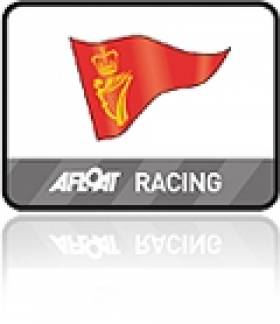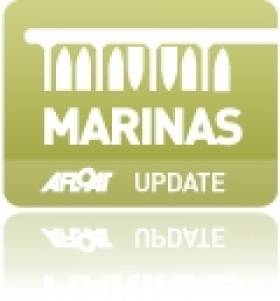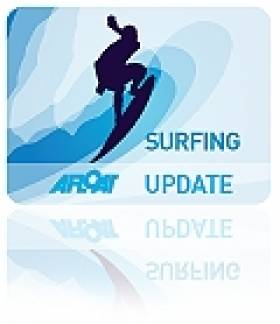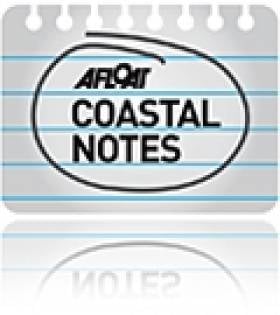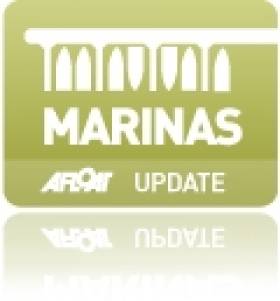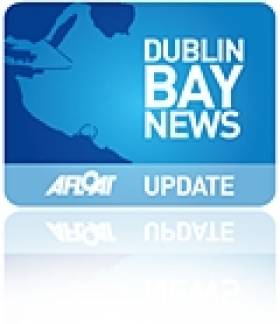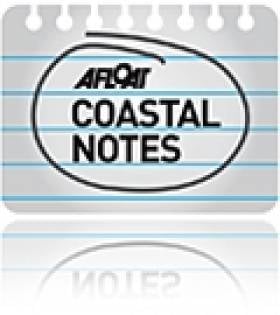Displaying items by tag: Blue Flag
Royal Cork Yacht Club Celebrates Blue Flag Marina Status
#marinas – The Royal Cork Yacht Club marina in Crosshaven in Cork Harbour is the only new marina in Ireland that has attained Blue Flag status in 2013 and is one of only three new Blue Flags awarded this year. The news of the new eco award for Cork was previously reported on Afloat.ie here.
Steeped in history, the Royal Cork Yacht Club in Crosshaven, Co. Cork, prides itself on being the oldest Yacht Club in the world and the award of Blue Flag status comes after last year's award of 5 Gold Anchor Marina status as well as an ICOMIA Clean Marina Award – an internationally recognised sure sign of a quality marina. ICOMIA is the International Council of Marine Industry Associations and represents the recreational boating industry worldwide.
There are now four Blue Flag Marinas in the country, the other three have had the award for the last few years and they are Kilmore Quay in Wexford, the Three Sisters Marina in New Ross and Killinure Point Marina in Westmeath.
The Royal Cork Yacht Club was the only new marina in Ireland that has attained Blue Flag status in 2013 and there was huge emphasis during the presentations on how difficult is for a marina to attain Blue Flag status.
Gavin Deane, General Manager, Royal Cork Yacht Club said: "This is another terrific achievement for the Club. Mark Ring, the Marina & Racing Coordinator at the Royal Cork led the project and put months of work into achieving Blue Flag status so it's great to see that work paying off. We can now call ourselves the oldest and cleanest yacht club in the world!"
The awards comes as planning begins for Cork Week 2014 Ireland's most prestigious yachting regatta, which takes place at the club in Crosshaven in July next year.
#blueflag – Three marinas from a necklace of up to 70 facilties of marinas, jetties and pontoons around the coast have been awarded An Taisce Blue flag for 2013.
An inland marina on Lough Ree on the River Shannon also received an award.
The awards were presented by the Minister for the Environment, Community and Local Government, Mr. Phil Hogan, T.D, at an awards ceremony held at Dún Laoghaire-Rathdown County Hall, Co. Dublin last Thursday.
The Blue Flag is one of the world’s most recognised eco-labels. The programme aims to raise environmental awareness and promote sound environmental practices and behaviours among beach and marina users. The 70 beaches and 4 marinas that achieved this award met a specific set of criteria related to water quality, information provision, environmental education and beach management.
Although the official awards citations say the only coastal marina to be awarded a blue flag is Wexford's Kilmore Quay Marina, operated by Wexford County Council, few would argue that Royal Cork marina in Cork Harbour is also coastal, even though the facility is strictly speaking located on the Owenabue river. Likewise the Three Sisters Marina at New Ross in Wexford has strong coastal links even though it is 18 nautical miles from the sea at Hook Head. This 66-berth marina is managed by New Ross Town Council and is located on the banks of the River Barrow.
In Westmeath a single freshwater marina was also awarded a blue flag. The Killinure Point Marina in Glasson, near Athlone is managed by the Quigley's and Waveline and it is located on the inner lakes of Lough Ree on the Shannon.
Ballinspittle a Popular Haunt for Surfing Crowd
#SURFING - The Irish Examiner reports on the "little economic miracle" that is Ballinspittle in Co Cork, a village that's "bucking the national economic trend" via its plethora of local businesses - and its close proximity to quality surf.
The village has "witnessed a inflict of Australians and South Africans" among others "in search of a surfing haunt", thanks to the nearby Blue Flag beaches at Garrettstown and Garrylucas.
John Hynes, who runs the surfing school GTown Surf, says Cork's coast is "one of the most consistent stretches in the south" that's "perfect for budding surfers. So, there's no excuse for not getting out there and enjoying the waves."
The Irish Examiner has more on the story HERE.
#BLUE FLAGS - Dollymount Strand has regained its Blue Flag status in this year's round of awards, which sees the largest ever number of Irish beaches and marinas recognised.
The beach on north Dublin's Bull Island - which recently hosted Ireland's top kitesurfers for the 'Battle For The Bay' - once again flies the Blue Flag after losing it last year.
Also among the Dublin beaches receiving the EU accolade this year are Donabate, its first award since 2007, and Skerries south, which had not held Blue Flag status since 1995.
The news follows just weeks after Northern Ireland celebrated its own record year with 11 resorts receiving the coveted prize.
A total of 87 beaches and marinas around Ireland's coastline were awarded Blue Flag status this year, with some notable exceptions from the list.
As The Irish Times reports, Rush South and Malahide beach failed to make the cut, while in Cork, Claycastle Beach and the front strand at Yougal lost their flags.
And Mullaghmore in Sligo - an area now world-famous for its top-class surfing - lost out due to safety issues involving roaming livestock.
The Irish Times has more on the story HERE.
#IRISH MARINAS - Two marinas were among the 11 resorts on the Northern Ireland coast awarded Blue Flag status this year.
It marks a record year for Northern Ireland's water quality standards as the EU's benchmarks grow increasingly strict, and represents a 100% increase over three years.
Ballyronan on Lough Neagh retains its Blue Flag status, while and Ballycastle Marina achieved the accolade for the first time, as the News Letter reports.
Other stretches retaining their status are Downhill, Benone, Portstewart, Tyrella, Whiterock and Portrush's East and West Strands.
Newcomers to the Blue Flag list are Cranfield West, Murlough and Crawfordsburn Country Park in Co Down, and Castlerock in Co Derry.
Meanwhile, seven beaches across Northern Ireland attained Seaside Awards for their high standards.
Environment Minister Alex Attwood said: “Today’s increase in Blue Flag and Seaside Awards is great news for Northern Ireland’s beach users and seaside towns as they know they can expect the best when they see a Blue Flag or a Seaside Award symbol."
The News Letter has more on the story HERE.
€220m for 9km Pipeline to Cut Dublin Bay Pollution
Dublin City Council is proposing a mammoth 9km sewage outfall pipe to help make Dublin Bay cleaner - at a cost of €220m.
Herald.ie reports that the 5m-wide pipe - longer than the Dublin Port Tunnel - would dump effluent from the Ringsend treatment plant far offshore, thereby avoiding pollution in the bay and sensitive areas such as Bull Island, which recently lost its EU Blue Flag status for Dollymount Strand.
Plans for the project, which DCC head of waste Pat Cronin described as the "greenest and most economic solution" will be open to public consultation in the near future, with a timetable for completion by 2015.
The pipeline and redeveloped treatment plant will be funded via the Department of the Environment's water services investment programme.
Ireland's Bathing Spots Among Cleanest in Europe
Ireland has ranked fifth in a new Europe-wide report on bathing water quality - but some beaches in Northern Ireland are falling short of strict EU standards.
MEP Jim Higgins welcomed the results of the annual Bathing Water Report for 2010, saying: "Ireland's scenic attributes are a primary reason for attracting tourists and it is essential that our coastal and inland bathing sites are also enticing."
Ireland has moved up five places from its overall rank of 10th in 2009, with 90.1% of all bathing water sites meeting the EU's Blue Flag guidelines for water quality at beaches and swimming spots.
However, the Daily Telegraph reports that a number of beaches in Northern Ireland and other parts of the UK were judged to be 'poor'.
Beaches at Newcastle and Ballyholme in the North are among 16 across the UK that did not pass the EU's strict checks for Blue Flags.
The 2010 report ranks Cyprus as the cleanest bathing spot in Europe, with 100% of sites passing EU insspection. It was closely followed by Croatia with 97.3%, Malta at 95.4% and Greece at 94.2%.



























